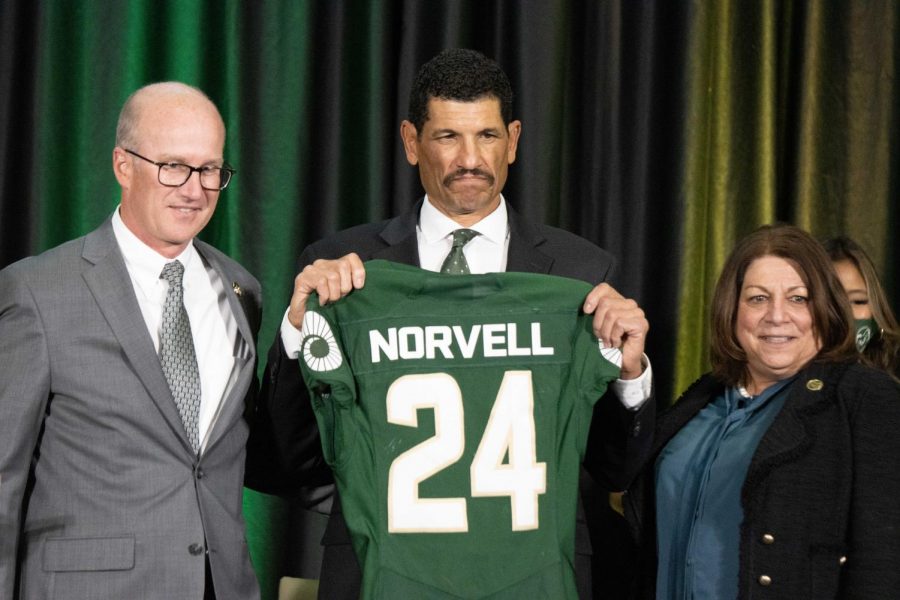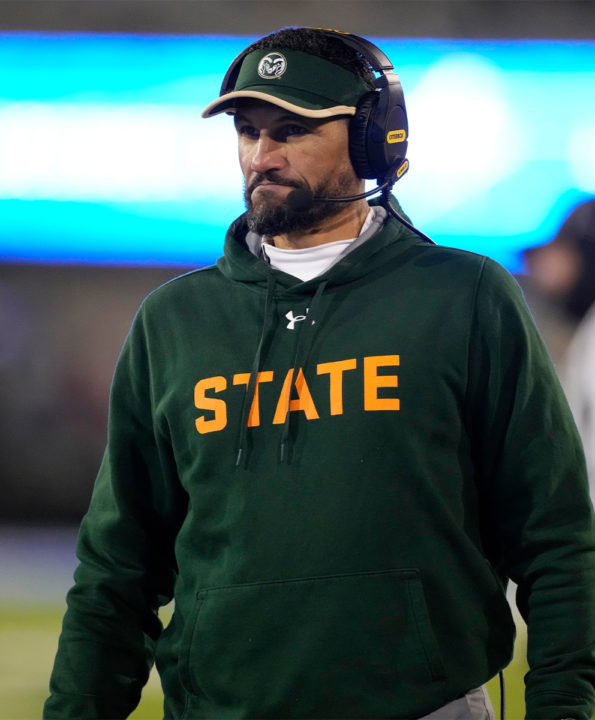Colorado State Football Coach: A Look at Leadership and Legacy

Colorado State Football Coach: Football has been a major part of Colorado State University’s identity for decades. The team’s performance on the field is shaped by the vision, strategy, and leadership of the Colorado State football coach. This figure not only directs the team’s gameplay but also plays a crucial role in molding the culture of the football program.
As the face of the Rams football team, the coach’s decisions can make or break seasons, while their impact extends beyond just wins and losses. The role of the Colorado State football coach is more significant than ever before, given the complexities of modern college football. This article takes a deep dive into the responsibilities, challenges, and historical significance of the role of the Colorado State football coach.

The Evolution of the Colorado State Football Program
The Colorado State Rams football team has a storied history that traces back over a century. Established in the early 20th century, the program has undergone numerous transformations. Each era has seen different challenges, from evolving game strategies to handling recruitment pressures, and through it all, the leadership of the Colorado State football coach has been pivotal. In the past, the Rams have seen successes as well as tough seasons, but the consistency of leadership through varying periods has helped the program stay competitive.
In the earlier years of Colorado State football, the team had a series of coaches who helped lay the groundwork for the competitive spirit that exists today. Coaches in the mid-20th century helped elevate the program’s profile in the Mountain West Conference, setting the stage for future coaches to build on. Over time, the role of the Colorado State football coach has transformed, becoming more strategic and focused on creating a lasting football culture. From grassroots-level recruiting to making pivotal decisions during high-pressure games, the modern-day Colorado State football coach is tasked with much more than just calling plays.
The evolution of the football program is intricately tied to the changes in coaching philosophies, recruitment strategies, and the increasing importance of football as a business. The current Colorado State football coach is expected to balance team success with program sustainability, ensuring that the Rams remain a competitive force within college football.
The Role of the Colorado State Football Coach Today
As college football grows in popularity, the expectations for a coach have expanded. The modern-day Colorado State football coach is not just a strategist and motivator on the sidelines; they are also a recruiter, a public figure, and a key part of the university’s brand. In today’s world, the responsibilities are far-reaching. A coach has to be effective in managing resources, analyzing opponents, motivating players, and maintaining a strong presence in recruiting circles. The demands of running a successful program require a level of versatility that goes beyond X’s and O’s.
One of the most critical aspects of being the Colorado State football coach today is recruiting. With the NCAA landscape continuously changing, attracting the right talent is more competitive than ever before. Coaches must not only identify the best players for their system but also make strategic decisions about scholarships, transfers, and the program’s long-term needs. Recruitment is not just about finding high school talent—transfer portals, NIL deals, and the influx of out-of-state athletes have all changed how a coach approaches team-building.
Beyond recruiting, the coach is also responsible for crafting a culture of success. College football programs are made up of athletes who are looking for more than just winning—they seek development, both as players and as people. The Colorado State football coach must be someone who can foster an environment where student-athletes thrive on and off the field. Whether it’s implementing discipline, building morale, or encouraging teamwork, the responsibilities are all-encompassing.

The Key Qualities of a Successful Colorado State Football Coach
Every great Colorado State football coach shares certain qualities that contribute to their success. Whether they are turning around a struggling program or maintaining dominance, certain traits are universally important in the position. Some of these qualities include leadership, adaptability, communication skills, and a strong work ethic. These attributes ensure that the football program operates smoothly and continues to grow over time.
Leadership is by far the most essential trait for a coach. The Colorado State football coach must lead by example, motivating players to perform at their best and holding them accountable for their actions. A great leader understands the importance of trust and respect—qualities that build lasting relationships with players, assistants, and staff. It is this leadership that often determines a program’s success over time.
Adaptability is another crucial quality for a Colorado State football coach. The game of football is constantly evolving, and coaches must be able to adjust their strategies and tactics to stay ahead of the competition. The ability to change with the times is especially important in college football, where players are recruited to fit specific systems, and game strategies shift with new trends in the sport.
Communication skills are indispensable for a coach. Whether it’s delivering halftime speeches, speaking with the media, or maintaining an open dialogue with the coaching staff, a successful Colorado State football coach must be a clear and persuasive communicator. Effective communication ensures that everyone is on the same page, whether in game planning or day-to-day operations.
Finally, a strong work ethic is a non-negotiable quality for a coach. Coaching a college football team requires long hours, commitment, and passion. A great Colorado State football coach goes beyond just attending practices and games. They are constantly analyzing film, adjusting playbooks, meeting with recruits, and seeking out opportunities to improve their team.
Notable Coaches in Colorado State Football History
The history of Colorado State football is rich with successful coaches who left a lasting impact on the program. From early trailblazers to modern legends, these coaches each contributed to the evolution of the Rams. One of the most iconic figures in Colorado State’s coaching history is Sonny Lubick, who is widely regarded as the program’s greatest coach. His tenure at Colorado State, spanning from 1993 to 2007, saw the team achieve incredible success, including multiple bowl appearances and conference championships.
Lubick is credited with transforming the program into a perennial contender in the Mountain West Conference, and his leadership set the standard for future coaches. Under his guidance, Colorado State became one of the top teams in the region, and his impact on the university and the program is still felt today. Lubick’s legacy is built on his ability to recruit talented players, develop them into stars, and maintain a high level of discipline and competitiveness.
Another coach who made a significant mark on the program is Jim McElwain. McElwain took over in 2012 and led the Rams to a bowl game in just his second season, reviving a program that had struggled in previous years. His success, both on the field and in recruiting, brought national attention to the program. McElwain’s ability to turn around a struggling program made him a beloved figure among Rams fans, and his coaching career continued to rise after leaving Colorado State.
Challenges Faced by the Colorado State Football Coach
While coaching at Colorado State can be a rewarding experience, it’s not without its challenges. The program competes in the highly competitive Mountain West Conference, where schools like Boise State, San Diego State, and Utah State regularly field strong teams. This constant competition places pressure on the Colorado State football coach to constantly improve the team, find new talent, and remain competitive.
Recruitment remains one of the most significant challenges for the coach. Colorado State is not as well-known as some of the larger schools in the Power Five conferences, so attracting top-tier talent can sometimes be a struggle. The coach must work tirelessly to sell the university’s program and convince young athletes that Colorado State is the right place for their development. As more athletes take advantage of the transfer portal and NIL deals, recruiting becomes even more challenging, as the dynamics of college sports continue to change.
Additionally, managing expectations can be a challenge for any Colorado State football coach. While fans are passionate and supportive, they can also be demanding, especially after a season of underperformance. The coach must strike a balance between satisfying fan expectations and keeping the program focused on long-term growth. The media scrutiny that accompanies the position can also add pressure, requiring a coach to be prepared for criticism and to remain calm under the spotlight.
The Future of the Colorado State Football Coach Role
As college football continues to evolve, so too does the role of the Colorado State football coach. With the ever-changing landscape of recruitment, transfers, NIL deals, and evolving fan expectations, the future of the position will likely require a more dynamic skill set. Coaches will have to adapt to the changes in college football while maintaining their focus on developing players and building successful teams.
One possible shift in the future of the Colorado State football coach role is the increased use of technology and data analytics. As teams become more data-driven, the ability to analyze player performance, predict outcomes, and optimize strategies will be key. Coaches will likely need to stay at the forefront of these changes to remain competitive.
Additionally, the increased focus on student-athlete well-being will continue to shape the role of the coach. In the coming years, the Colorado State football coach will likely play an even greater role in ensuring that players are given the resources they need to succeed both on the field and academically. Creating an environment of support and care for the players will be a priority for future coaches.
In conclusion, the role of the Colorado State football coach is an ever-evolving and dynamic position. From recruiting and game strategy to managing player development and maintaining program culture, the responsibilities are vast. However, the right coach can lead the Rams to great heights and establish a legacy that will be remembered for years to come. As the program continues to grow and adapt, the leadership of the Colorado State football coach will remain the driving force behind its success.






